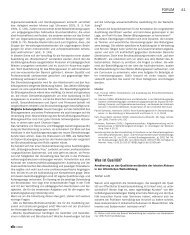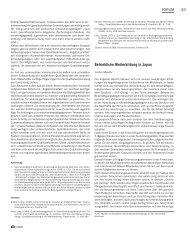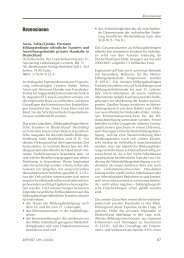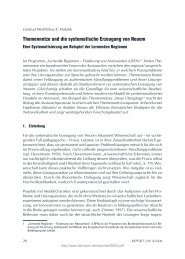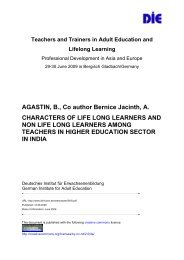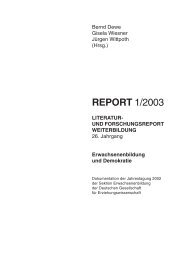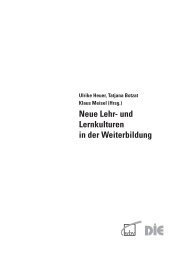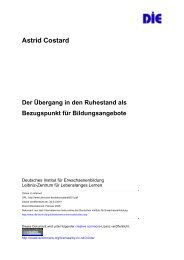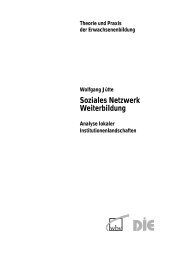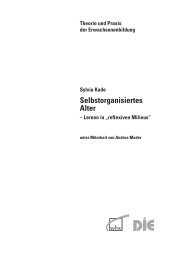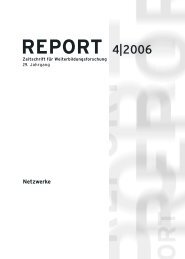Accreditation of Prior Experiential Learning (APEL)
Accreditation of Prior Experiential Learning (APEL)
Accreditation of Prior Experiential Learning (APEL)
Create successful ePaper yourself
Turn your PDF publications into a flip-book with our unique Google optimized e-Paper software.
important stepping stone on the path to returning to learn for adults who may have<br />
been disaffected or let down by initial schooling. Informal learning is assessed and<br />
transferred into a commodity, a credit. <strong>APEL</strong> is also significant in enhancing the learning<br />
confidence <strong>of</strong> “marginal learners”, such as adults with few qualifications or those<br />
who have been out <strong>of</strong> the education system for a long time, in helping them to develop<br />
their learning skills, and design a learning trajectory. Importantly it places the learner<br />
at the centre <strong>of</strong> the learning process. However, the process is not without contradictions<br />
in assessing and quantifying the reflective processes <strong>of</strong> learning acquired informally<br />
as critics such as Assiter/Shaw (1993) have pointed out. Barkatoolah (1998) stresses<br />
that <strong>APEL</strong> should be used as a tool for qualifying without accreditation and that certification<br />
should only apply if it is appropriate for the individual learner. For her <strong>APEL</strong><br />
should be “qualifying not certifying”. Despite this <strong>APEL</strong> is a valuable tool for encouraging<br />
adult learners to reflect upon their experiences in their own language, identifying<br />
the learning processes and providing evidence demonstrating that learning has taken<br />
place.<br />
Butterworth (1992) identified two main models <strong>of</strong> <strong>APEL</strong> within higher education: the<br />
credit exchange model and the developmental model. The former model awards credit<br />
by matching informal or non-credited learning with learning outcomes within an<br />
accredited programme. It is the learners’ responsibility to demonstrate that their prior<br />
learning and competencies match those <strong>of</strong> the accredited module through a process <strong>of</strong><br />
reflection, defining, conceptualising and a self-audit <strong>of</strong> individual experiences and<br />
competencies. This outcomes-based approach enables an adult learner to gain exemption<br />
from a particular module. For part-time adult undergraduates <strong>APEL</strong> is valuable for<br />
speeding up gaining a degree. However, <strong>APEL</strong> is also used at postgraduate and foundation<br />
levels as well as for pr<strong>of</strong>essional courses. The credit exchange model has largely<br />
developed in response to the need by governments for a more qualified workforce. In<br />
contrast the developmental model is described by Trowler (1996) as the “credit-exchange<br />
plus” model. It draws on Kolb’s (1983) concept <strong>of</strong> the learning cycle. The<br />
learner reflects upon, evaluates and identifies previous learning experiences through<br />
the writing <strong>of</strong> a portfolio, a diary, a biography, pictures, analysing documents. Personal<br />
reflection lies at the core <strong>of</strong> this model in which the learner is central to the learning<br />
process. In higher education institutions such an approach may be used as a distinct<br />
module in its own right. In practice, Trowler (1996) argues that <strong>APEL</strong> systems operate<br />
on a continuum between the two models with institutions <strong>of</strong>fering a range <strong>of</strong> <strong>APEL</strong><br />
methodologies.<br />
Adult educators such as Freire stressed the centrality <strong>of</strong> experience in adult learning<br />
while others such as Knowles (1990) and Brookfield (1983) point out that adults bring<br />
with them a wide range <strong>of</strong> skills and knowledge to the learning situation. A study by<br />
Hutchings/Wutzdorff (1988) looking at how people learn within the context <strong>of</strong> workbased<br />
learning concluded that how we learn is “not simply a matter <strong>of</strong> application but<br />
rather an ongoing interactive process in which both knowledge and experience are<br />
repeatedly transformed”. The concept <strong>of</strong> situated learning from a constructivist per-<br />
59


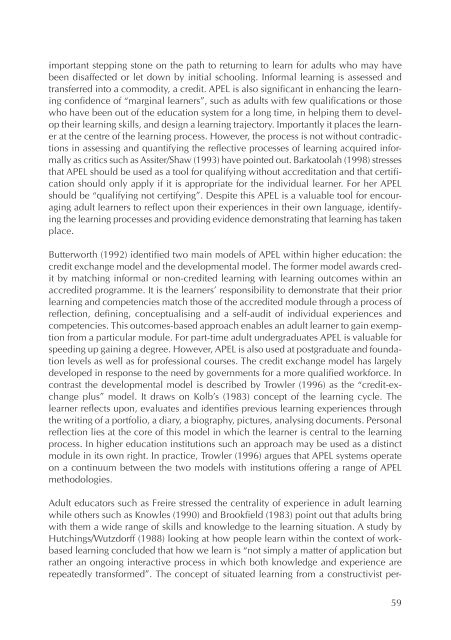
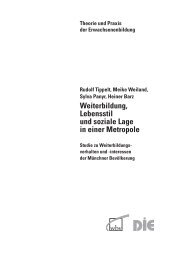
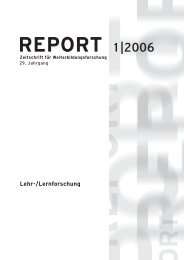
![PDF [KB 892] - Deutsches Institut für Erwachsenenbildung](https://img.yumpu.com/7495168/1/144x260/pdf-kb-892-deutsches-institut-fur-erwachsenenbildung.jpg?quality=85)
